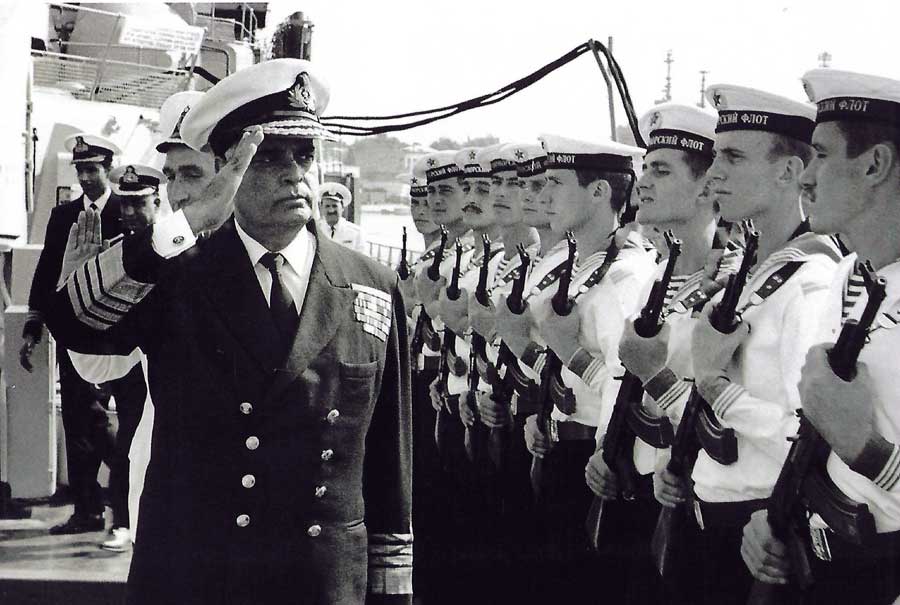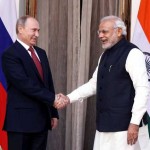IDR Blog
IA has Field Marshal, IAF has Marshal of Indian Air Force, Indian Navy’s glory deserves the honour of ‘Admiral of the Fleet’ rank
It remains to be seen whether the present Govt. recognizes and bestows the rank and recognition of ‘Admiral of the Fleet’ to the Indian Navy and Admiral Nanda, the man who bombed Karachi and gave the Indian Navy its due recognition in national and world maritime history.
As India gears up to commemorate the 51st anniversary of Indian Navy’s resounding victory in 1971 War – scripted through Operation Trident – under the stellar leadership of then Chief of Naval Staff Admiral SM Nanda, what continues to pinch Naval veterans is the sordid denial of the of ‘Admiral of the Fleet’ honour to Indian Navy and then Naval Chief, who planned and executed Operation Trident with finesse on the night of December 4, 1971, recording the only victory in the annals of maritime war.
Sam Manekshaw MC, then Chief of Army Staff, was honoured with the rank of ‘Field Marshal.’ Air Marshal Arjan Singh got the rank of ‘Marshal of the Indian Air Force,’ whereas the Indian Navy is the only service which even after 51 years of 1971 naval war victory yet awaits the most deserving ‘Admiral of the Fleet’ honour despite phenomenal contributions made by Indian Navy under the daring and decisive leadership of Admiral Nanda.
Such recognition to the Indian Navy will ensure that Admiral Nanda’s legacy serves as a source of guidance and inspiration for current and future generations of naval officers, encouraging them to uphold the highest standards of professionalism and dedication in the defense of their nation’s sovereignty.
Just after taking over as the country’s Navy Chief in 1970 when the navy was already at the margins, the then CNS, popularly known as Charles Nanda, plunged headlong into preparations for war where a strike on the enemy’s spine was fast, bold and decisive. The whole world was left in a state of wonderment and sheer disbelief by the havoc Indian Navy wrecked in Karachi Port on December 4, 1971. It was an incredible feat made possible by the fleet of Admiral Nanda, a distinguished naval officer and strategist par excellence.
On December 3, 1971 Pakistan had launched an unprovoked attack on Indian airfields. India faced challenges from both West Pakistan and East Pakistan and was left with no choice but to respond with decisive force. Admiral Nanda was seething with rage. It was now time to strike fast, and strike bold. The legendary Admiral rolled up his sleeves to teach the enemy a lesson in style. The missile boats were towed to Karachi by larger warships. The attack on Karachi Port displayed the strategic prowess and determination of the Indian Navy under the stellar leadership of Charles Nanda.
The strategy room at the Indian Naval Headquarters was occupied for hours at length as Admiral Nanda and his team planned what would go down as one of the most successful attacks in modern naval history. He decided that an attack on the Karachi harbour would ensure a blockade on the Pakistani Navy, effectively cutting the western command from East Pakistan.
Armed to the teeth, the fleet raced towards Karachi Port on December 4 to execute the attack which did not only bring India victory in the deadly war against Pakistan in 1971. Three Vidyut-class missiles – INS Nirghat, INS Nipat and INS Veer – had already been deployed at Okha, in Gujarat, and the fleet was increased to arm each of the missile ships with four Styx missiles each. Apart from these, two Arnala class submarine corvettes – INS Kiltan and INS Katchall – and a fleet tanker were added to the fleet.
Operation Trident – the brain child of Admiral Nanda – that lasted under 30 minutes – left behind a trail of devastation, sending a shiver down the spine of Pak establishment. Karachi Port kept burning for seven days. It displayed the strategic prowess and determination of the Indian Navy under the stellar leadership of the then CNS, also nicknamed as Charles Nanda, with no casualties on the Indian side.
The exemplary Operation Trident in 1971 – the only war in which the Indian Navy took part in– destroyed and sank battle-class destroyer PNS Khaibar, ammunition carrier Venus Challenger, an adjutant-class minesweeper PNS Muhafiz, and destroyer PNS Shah Jahan. The Karachi Port burnt for seven days. Operation Python, another deadly attack orchestrated by Admiral Nanda, popularly known as Charles Nanda, proved the last nail in the coffin of Pakistani establishment, leading to the creation of Bangladesh from the erstwhile East Pakistan.
Will the Govt. restore the glory of the Indian Navy?
Given the colossal contributions, the then CNS made in turning the tide in favour of India in 1971 war, the conferment of ‘Admiral of the Fleet’ rank upon Admiral Nanda will ever emphasize his inspirational leadership, extraordinary abilities and strategic foresight as a naval officer.
Naval veterans unanimously feel that the aggressive, action-oriented Admiral Nanda brilliantly transformed the Indian Navy to rise to the occasion valiantly. A visionary and tactician par excellence, Charles Nanda had mastery in electronic warfare. They bemoan how Admiral Nanda was left out by the country’s leadership in giving him and the Indian Navy their due recognition.
However, fifty-one years on, the largest naval missile engagement in maritime history tells us how rare force-on-force naval combat had been since the Second World War under the most superior and strategic leadership of none other than then Naval Chief Admiral Nanda.
What Admiral Nanda was able to achieve was extraordinary and unprecedented. The victory was so astounding and decisive that it even amazed the Russians. “My Great Indian friends have achieved the impossible,” Admiral of the Heroic Fleet of the Soviet Union (Glavkom) – Gorshkov shared his astonishment and alacrity with Admiral Nanda over his remarkable triumph.
Even the American Admiral in his inscription on his memoir ‘ON WATCH,’ by Elmo R Zumwalt Jr, Admiral USN (Retd) wrote: “To Admiral SM Nanda who knew the key, in 1971, to avoiding mishap! With respect!” Admiral Zumwalt, who was the Chief of Naval Operations, US Navy, in 1971, led the U S Seventh Fleet to intimidate India during the 1971 Indo Pak War.
Admiral Zumwalt in a letter dated 6th December 1989 to Admiral Nanda, shared the inscribed copy of his book ‘ON WATCH’ wherein he mentions: “Here, in India, Admiral Nanda, now retired, told us that his instructions to his ships at that time were – If you encounter US Navy ships, invite their captains onboard for a drink.”
With so many accomplishments by the Indian Navy during and after the 1971 War and heroic applause by Russian and American Admirals, it remains to be seen whether the present Govt. confers the rank and recognition of ‘Admiral of the Fleet’ upon the Indian Navy and Admiral Nanda, the man who gave the Indian Navy its due recognition in national and world maritime history.
——————————————————————————–
For more information please contact:
Mr. Sunil Khosla, Mob- 9811026667, Email-sunil.khosla@fourthestateindia.com
Rituparna Madhukalya, Mob: 8860117728, Email: ritu.moo12@gmail.com
Post your Comment
One thought on “IA has Field Marshal, IAF has Marshal of Indian Air Force, Indian Navy’s glory deserves the honour of ‘Admiral of the Fleet’ rank”
 Loading Comments
Loading Comments





It is like saying the COAS organized a raid by a company of Infantry OR the CAS planned a sortie by a Squadron of fighters in 1965/1971 wars ,so deserve to become a Field Marshal or Marshal of the Air.
Do you have any idea of perspective and scope at various levels of heirachy in the armed forces?
Dont try and start a narrative just for the heck of it.Just using bombastic words does not commensurate with scope and action.